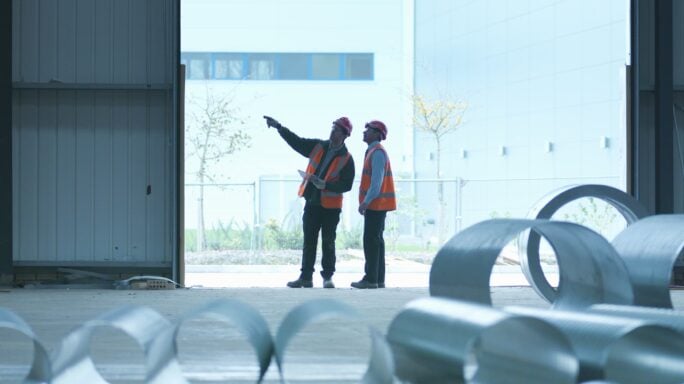Money Matters
JSL Restoration: ‘We are laying the foundations for business resilience.’

In our Your Story series, we speak to business owners about the challenges they’re facing and the steps they’re taking to overcome them. In this interview, Cindi Miceli, the office manager of JSL Restoration, shares how to lay the foundations for resilience.
How do you practice social distancing on a scaffold? Every business has its own balance beam.
If I were to describe JSL as a company in one word, it would be transformative.
It’s what we do in the masonry restoration industry, and it’s been a valuable characteristic for the vitality of this business since it started in 1989.
We’ve transformed some of the most notable buildings in the Midwest, from the State Capitol in Madison, Wisconsin to the University of Chicago Cloisters building.
All businesses need a degree of transformative spirit to forge ahead this year, adopting new ways of working to keep the business going. Although no one could have predicted a global pandemic, in a way, I am grateful that our existing culture and processes have prepared us to bear the brunt of it.
It’s important to ensure those foundations are in place, and as a result, trickier conversations around forecasting, scenario-testing and more creative contingency plans will follow suit.
Develop creative solutions to overcome issues in the field
We’ve never had an official business continuity plan, but everyone who works in the office has always been able to work from home. That ability has always been important to the business to allow our workforce to be flexible as needed.
Once coronavirus hit, it was imperative to develop guidelines around remote working, and for our field workers, as quickly as possible. Those in the field were already wearing masks to protect themselves from the dangers of masonry, and we made quick adjustments to ensure hand sanitizer was at every worksite and for everyone to practice social distancing.
However, we had to make some adjustments to some of our HR processes. For example, some of our workers still receive paper checks, so one of our HR staff prints them at her house and then takes them to the office for workers to pick up. We have also scheduled different times for staff to come to the office as needed so only one or two are there at a time.
The biggest issue has been enforcing social distancing for our field workers because of the environment in which they work. How do you practice social distancing on a scaffold? We can keep workers separated if the scaffold is large enough, but if it’s not then only one can be on there at a time.
Digitize financial processes and scrutinize cash flow data in real time
As the winter months are always slower for us, we had already planned to operate with a reduced staff. Having said that, we had a few continuing projects during our down season, but some clients had to cancel because of coronavirus.
Fortunately, we had just finished up with some bigger projects that have allowed us enough cash to make it through our down season–but cash flow is always tight for us during this time.
The way that we have historically dealt with fallow periods is to forecast cash flow and adjust spending and expenses accordingly using accounting software. Forecasting helps us to see how much revenue we can generate before our down season to carry us through until business picks back up. We can set targets well enough in advance so that we have enough cash flow throughout the year to cover everything the business needs. This digitized accounting model is helping us during this chaotic time. All of our financial data is in one system, so we can see all streams of cash flow in real time. We can see where we would have surplus cash and where we need to apply it across the business to keep us going.
Use this opportunity to streamline business processes
I’ve been the office manager at JSL Restoration for two years. Once I joined, my top priority was to work with the other departments to transform internal processes to manage core functions more productively.
The next step was to create manuals to document our processes so everyone could operate with uniformity. We set detailed guidelines for everything, from how to process payments, to sending invoices and receiving payments.
We laid down the rules for everything, so we could become more consistent in what we do and more productive. For example, we outlined how to place orders with our vendors and how to capture purchases made with a company credit card so workers in the field have enough inventory to complete every job when things pick up again.
Now is the time for businesses to reassess internal processes and clearly map out guidelines for the future. Having this in place will make it easier to manage office tasks remotely, tighten gaps and impose uniformity.
Our restoration business isn’t about merely repairing wear and tear. We are passionate about restoring historic buildings to their former glory. That thinking can be applied to how we look at the economy going forward. This is an opportunity to go beyond fixing what’s broken. Now is a chance for businesses to fundamentally re-invent themselves to align with the forward-thinking they’ll need to thrive in the future.

JSL Restoration was instrumental in the transformation of Wisconsin’s Capitol building.
My takeaways
Here’s what’s worked best for our business.
- Tighten up your workflows
Had we not built new ways to make our internal processes smoother and faster, there’s no way we would have been able to keep the business going. Now is the time to cut back on manual tasks and to adopt software that empowers your business to be flexible in unpredictable times. - Create guidelines to document processes
Ensure your staff is as productive working remotely as they are in the office by sharing with them the guidelines and instructions they need to do their jobs. Software is only useful if your team understands how to use it and how it helps them in their role. You can feel confident in your staff working remotely when you’ve documented your process flows and details. - Communicate with your team
So many changes needed to happen once our office closed. We had to schedule different times for people to come to the office to limit the number of people there at once. As projects cancelled, we had to move people around to make sure we were adequately staffed at every site. We had to make sure everyone knew what was happening and why as new information became available. Communication is critical—especially when some of your staff is remote, others are in the field, and everyone is looking for information on how to carry on with their jobs. You can’t over-communicate during times like this. Build a steady cadence, but also be prepared to deliver real-time updates as needed. - Enable remote working where possible
Your remote working capability is your saving grace. Once everyone is set up and running your workforce will have flexibility and freedom to do their job. Think outside of the box. Not all of your office tasks will be easily transferred to handle remotely. Think creatively to handle payroll tasks that involve paper or take this chance to digitize them. Be prepared to think outside the norm when looking for workarounds.







I am truly amazed by the vitality of many businesses and their employees. We were hit with this pandemic and many businesses were like “Well the show must go on!” Our company provides quick services on vehicles such as oil changes, fuel and cabin filter replacements, windshield wipers, top offs, radiator maintenance, to name a few. With the help of our management team and corporate office, we developed a solid COVID-19 plan. We enforced employees to wear gloves and face masks, temp in and out of building, vigorous routine disinfecting of surfaces, and providing services to our customers as they remain in their vehicle and also allowing them to use hands free payment options. I would say these efforts and the dedication of our team members has helped us remain productive. Sure our sales dropped slightly, but we stayed strong through what we hope was the worst of this crisis. Americans are strong, resilient, and adaptive. It makes me greatful to live in such a wonderful country.
Hi Crystal, thanks so much for your comment. We really appreciate you sharing your company’s efforts to remain resilient, adaptive, and productive during these hard times. – The Sage Advice Team